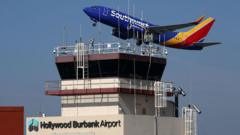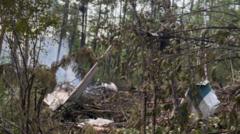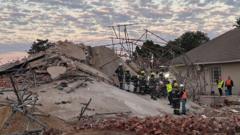The investigation into the devastating Air India Flight 171 crash continues to unfold, with initial reports shedding light on the circumstances surrounding the incident while also raising significant questions. The Boeing 787 Dreamliner, which plummeted into a building shortly after departing from Ahmedabad, India, en route to London, led to the tragic loss of 241 lives onboard and 19 more on the ground. Surprisingly, one passenger managed to survive.
A preliminary report from India's Air Accident Investigation Bureau (AAIB) has provided a brief overview, but critics argue that it has left out crucial details that could clarify the cause of the crash. Under international protocols, the AAIB was required to release this preliminary report within 30 days, and while it fulfills that requirement, it does not offer definitive conclusions.
One major area of concern raised in the report is the operation of two fuel cut-off switches shortly after takeoff, which resulted in the engines losing thrust. This critical detail has prompted ongoing speculation regarding the pilots’ actions, as the switches are designed to be intentionally operated, making their deployment during a flight particularly alarming. Although the report notes a dialogue between the pilots regarding the switches, it lacks crucial context, including the identities of the speakers and their exact words, as the cockpit voice recorder's transcript remains unreported.
This lack of transparency has sparked outrage amongst aviation professionals. The Indian Commercial Pilots' Association, in an open letter, condemned the insinuation of pilot intent in the absence of verified evidence, calling such claims "insensitive" to the victims and their families. Air India’s CEO, Campbell Wilson, echoed this sentiment, cautioning against hasty conclusions.
Industry experts interviewed by various media outlets have voiced their concerns, noting that the information provided in the report seems selective and leaves numerous critical aspects unaddressed. Notably, there is no detailed account of the engine's status during the moment the switches were toggled or the precise events leading up to the fuel cut-off.
Additionally, controversy has emerged surrounding a reference to a safety bulletin issued by the US Federal Aviation Administration (FAA) in 2018. The bulletin warned of potential issues relating to the locking features of similarly designed fuel cut-off switches but noted that it was not associated with any safety concern. Critics argue that the report fails to clarify relevant connections to this bulletin and how it relates to the situation aboard Flight 171.
As calls for further inspection and clarification grow, experts emphasize that without comprehensive data, the true causes of this tragedy remain obscured. The final report is expected to be issued in accordance with international protocols, but such completions can often take significant time, leaving victims’ families and aviation authorities in a prolonged state of uncertainty.




















